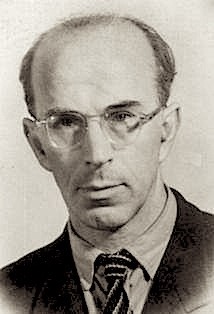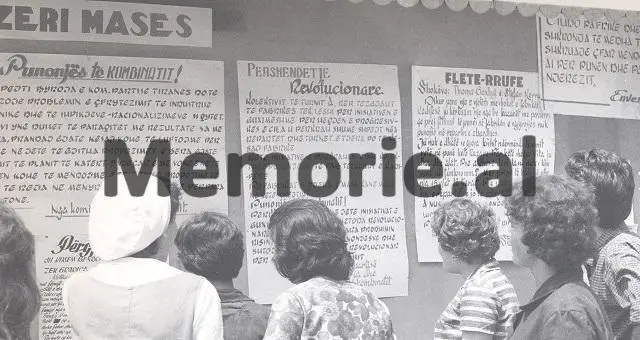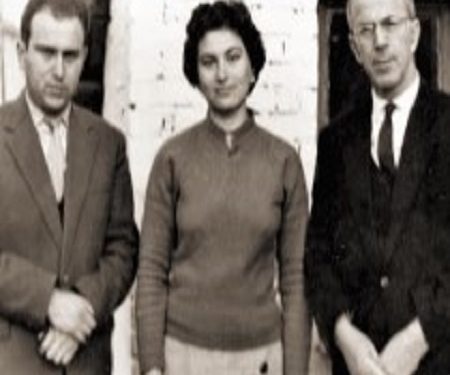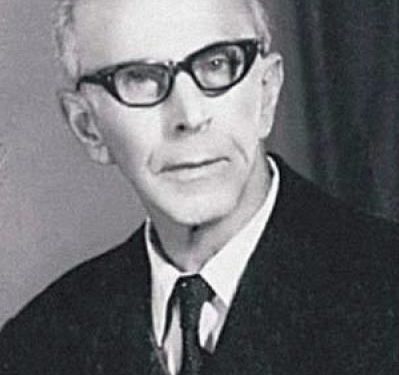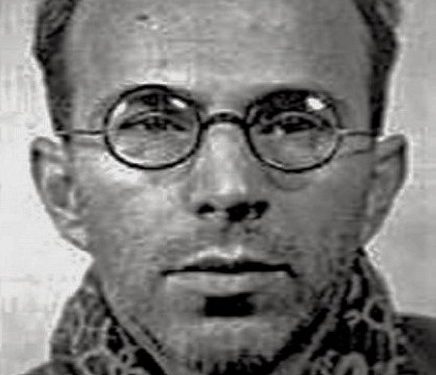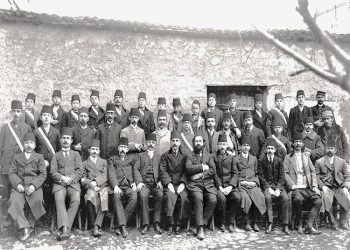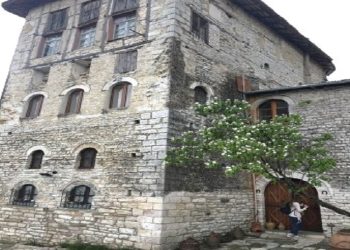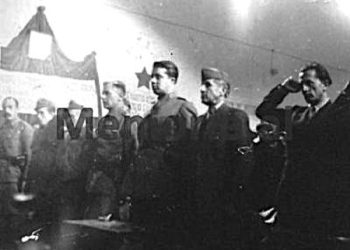By Engjëll Angoni
Memorie.al / Prof. Dr. Selman Riza, master of 12 languages, dedicated and passionate researcher of his mother tongue, ranks among the most prominent Albanian linguists, as one of the founders of the new Albanian linguistics. A worthy son of Kreshnik Kosovo, he openly and resolutely resisted the fascist occupation, worked and fought with all his might for the freedom and rights of Albanians in their ethnic lands, for the national unity of Albanians, for freedom of thought and the democratization of life. In our country. Because of this, he was persecuted throughout his life, exiled and imprisoned several times by three of the most totalitarian regimes: the Italian fascist regime, the communist regime of Enver Hoxha and the communist regime of Josif Broz Tito.
Excellent pupil and student, staunch anti-fascist
Selman Riza was born on 21.12.1909, in the city of Gjakova. He grew up in a simple citizen family. As a child, he was distinguished for his intelligence and special interest in knowledge, which he could not get in Serbian schools, therefore in 1922, before turning 13 years old, together with a group of young Kosovar men; he secretly crossed the Albanian-Yugoslav border and came to foot in Tirana. With a state scholarship, he successfully finished the 6-year school “Naim Frashëri” in Tirana in three years and the nine classes of the National Lyceum of Korça in 6 years. With unique results in lessons and exemplary behavior, he deserved the highest evaluations from the school team.
Its technical director, Leon Perre, on 25.06.1931, at the end of the matriculation exams, where he graduated excellently in mathematics, would write to the Minister of Education: “Selman Riza is a very talented young man, very serious, who will be able with the same ease to complete any branch of university studies and I do not doubt that he will not later honor the country with his name”. Selman Riza’s life and work confirmed his prediction. Yes, with a state scholarship, he attends higher studies in France, at the University of Toulouse. In three years, 1933-1935, he successfully graduated from two faculties, Literature and Law, and with the same success completed his specialization in the German language, in the city of Heidelberg, Germany. He was appointed a teacher of French and Albanian, later Latin and German, at the Korça National High School.
Without a doubt, the invasion of our homeland by Italian fascism, on April 7, 1939, was a bitter event, just like for all the Albanian people, and for Selman Riza. Among the Liceu professors, he was one of the most exposed demonstrators and the most consistent resisters against the occupier. Not by chance, in the meeting that was organized those days in the City Hall, Selman Riza was elected secretary of the Public Rescue Committee for Korça, with Fazlli Frashëri as its chairman, in order to register and send volunteers to Durrës, where it would be organized armed resistance against the Italian invaders, also in Korça. This is how Selman Riza’s anti-fascist stance, inside and outside the school, is evaluated by the police: “Selman Riza is a determined opponent of Italian politics. A skilled propagandist among the student element. Dangerous” (Central State Archive, File 312, p. 408).
According to Prof. Abaz Ermenjit, “In the great anti-fascist demonstration of November 28, 1939, Selman Riza was in the front row together with other organizers”. That night, the carabinieri arrested Selman Riza. It would be his first meeting and acquaintance with the prison, the beginning of various political persecutions, which would accompany him throughout his life. On 08.12.1939, Selman Riza was transferred to the high school in Tirana by the prefect of Korça, Anton Kosmaçi “in full agreement with the Command of the Carabinieri Group in Korça” and simultaneously notifying with letter no. 235 XVII rez. 07.12.1939, Ministry of Internal Affairs (AQSh, fund no. 252/2, file no. 2, 1939, p. 897). Less than two months later, he is punished again: he is arrested and exiled to the Italian island of Ventotene, together with other anti-fascists “taking into account their personality and political past, the activity developed and their dangerousness”, the Internment Commission, exiles 3 years, to be served in Italy (AQSh, fund no. 253, file no. 312, 1943, p.408).
On October 4, 1941, Selman Riza was released from exile, but as early as a month earlier, on September 3, 1941, the General Presidency in Albania asked the High Command of the Carabinieri to “trace and monitor Selman Riza”. The situation of Selman Riza in 1942 became very difficult, not only due to economic reasons, but also due to continuous persecutions by all the quaestures of Albania and the General Directorate of Police (AQSh, fund no. 2253, file no. 275, 1942 , p.58).
The real brain of the irredentist anti-fascist movement
In these difficult circumstances, but also worried about the state and future of Kosovo, Selman Riza, settles with his family in Prizren, where he works as a lawyer, but primarily deals with political activities. He stands out as one of the main leaders of the Irredentist Antifascist Movement. Major Peter Kemp, one of the main representatives of the English missions in Albania, during the Second World War, calls Selman Riza “the real brain of the Irredentist Party”. The activists of this movement demanded that the direct and urgent goal of the war for liberation from fascism be directly connected with the non-return of Yugoslav rule in Kosovo, with the further struggle for the unification of the Albanians of Kosovo, with the Albanian people and state. Selman Riza was against cooperation with the Communist Parties in Albania and Yugoslavia, as well as with the National Liberation Movements in them. He did not join other political forces either.
Meanwhile, he has welcomed every important effort or request of any Albanian political force, for the freedom and national unity of the Albanians, such as, among others, point 2 of the “Dekalog”, the 10-point program of the National Front organization, which briefly states, but clearly: “We fight for a free, ethnic, democratic Albania with a modern social base”, which coincided with the basic goals of the Irredentist Antifascist Movement. For the same issue, the same evaluative position was taken towards another important document, namely the resolution of the Bujan Conference, 31.12.1943 – 02.01.1944, where, among other things, it was emphasized: “In Kosovo and Metohija, the majority of the population is made up of Albanians who have desired and wish for union with Albania”.
Following closely the platform and activity of the Irredentist Anti-Fascist Movement and the importance of Selman Riza as its political leader, the Yugoslav communists, especially, tried hard to approach him and make him their own, in order to achieve their goals. This is how the Central Committee of the Yugoslav Communist Party informs, on 31.01.1944, Pavle Javičevič, secretary of the Provincial Committee of P.K. Yugoslavs: “The Irredentist movement is the most positive of all the other currents, but for us, the most dangerous, because at its head is the lawyer Selman Riza, who did not cooperate with the invaders…! We have several times enabled contact with him, but without the blessings, because we are discussing the issues on the basis of the ‘Atlantic Charter’, we have no possibility to achieve anything.
He is against cooperation with the Yugoslav National Liberation War and P.K. Yugoslavs, and also says that he does not want to be associated with the Albanian KP and the LNÇL of Albania either. He wants some independence as of today, for Kosmet to break away from Yugoslavia, despite his attitude and fruitless talks, we continue to keep in touch with him, because he has great influence” (IRPS Archive, no. Reg. 4319). As asserts Selman Riza himself, there has been no shortage of threats either. According to him, “Albanian leaders of the LNCL of Kosovo, such as Xhavit Nimani, etc., inform him that the LNCL of Yugoslavia would fight as an enemy any organization outside it, even if it fought in consistently against the occupier” (Archive of the Ministry of the Interior, “Processing file” Tirana, 07.12.1955, p. 16).
Imprisoned by two communist regimes
On 12.01.1945, just a few days after his return to Albania, namely on 12 December 1944, in order to avoid the danger of the Titian executioners “as an anti-Yugoslav Kosovar”, he was imprisoned by the forces of the Albanian State Security, by order of Koçi Xoxes, at the request of the Yugoslavs, who accused him as: “leader of the Irredentist Antifascist Movement”. After three years in prison, without trial, on January 11, 1948, Selman Riza was handed over to the Yugoslav authorities, who kept him imprisoned in Prizren for more than three and a half years, until August 1951, again without trial. He is exiled to Sarajevo, temporarily unemployed. In the years 1952-1953, he served as a lecturer of French at the University of this City. He stands out as one of the best professors in the entire teaching body.
In October 1954-1955, with the interest of the Kosovar scientific authorities, he served as a scientific worker and head of the language section at the Albanian Institute of Prishtina. Selman Riza, with complete success, returned to the study work, which he had started as early as 1944 with the publication in Tirana of the work “Three Albanian monographs”, where with numerous personal data and help, he deals with important problems of the language Albanian literature. Within 5 years, in addition to several articles, he wrote several important works (“Serbo-Croatian Grammar”, 1952; “The Beginnings of Albanian Language”, 1952; “Albanian Dialects and Their History”, 1953, etc.), with which provided a valuable help for Albanian studies to take a good development in Kosovo. This is why Kosovar linguists praised Selman Riza as: “the sower of the seed of Albanianology in Kosovo” (Hilmi Agani, Besim Bokshi, Rexhep Ismajli, Preface, p. VII, Prof. Selman Riza, “Albanistic Studies”, “Rilindja” , Pristina, 1979).
Selman Riza, although threatened, refused to deny Albanian citizenship in exchange for Yugoslav citizenship. Consequently, on 12.12.1955, the UDB bodies returned him to Albania, as unwanted by their regime. In January 1956, Selman Riza was appointed a scientific worker at the Institute of History and Linguistics in Tirana. This appointment is preceded by a letter that the former Minister of Internal Affairs, Kadri Hazbiu, sends to Enver Hoxha, in which, among other things, he informs him that, from the investigations carried out by the Security agencies, “we come to the conclusion that, Selman Riza is a man of high culture, very fond of scientific studies, especially in the field of linguistics, he is a chauvinist, a strict fighter against Yugoslavia, he hates communism, but during the war it does not appear that he worked with the occupation. We think he should be allowed to residence in the city of Tirana and to be given the opportunity to work at the Institute of Sciences, as he has stated and requested”.
Always being a scientific employee at the Institute of History and Linguistics, he taught several years in a row, at the Faculty of History and Philology of the University of Tirana, the subject of Morphology, a special course on the language of the old Albanian authors, as well as the subject “History of the Albanian written language”.
Major contributions in various fields of science
In a short period of 11 years, 1956-1967, as a scientific worker and lecturer, Selman Riza developed the most extensive and successful scientific activity, the results of which ensured him a place of honor in Albanian linguistics. Taking a look at the scientific activity of Selman Riza, in its entirety, it is striking not only the persistent work and broad culture, the extraordinary scientific dedication and the logic of argumentation, the creative force and outstanding originality, the critical and principled attitude, the breadth and depth of thinking, insight and the ability to penetrate the depth of problems, but also the extent of scientific interests in many important fields, such as grammar, history of language, general linguistics, textology, linguistic criticism, terminology, literary language, etc. But the main areas, where he gave the most valuable help and left an indelible mark are: 1. The morphology of today’s Albanian language and its historical morphology, 2. The language of the old Albanian and Albanian writers.
An important place in Selman Riza’s scientific activity is the study of the language of our old Albanian and Arbëresh writers: Gjon Buzukut, Pjetër Budit, Frang Bardhit, Pjetër Bogdanit, Lek Matrëngës.
Throughout his scientific activity, Selman Riza has also distinguished himself as a critical linguist. The Albanian school of scientific criticism, if we talk about one in our country, undoubtedly begins with Selman Riza, as its founder. He criticizes with unparalleled harshness the dilettantism, mediocrity, simple and in-depth description, conformism, excessive and unsupported complacency in Albanian language studies. At the root of his linguistic criticism lies the discovery of scientific truth.
The call of the Party Committee: “Selman Riza’s head should be cut off”
During the eleven-year period, 1956-1967, Selman Riza was not only noted for his extensive, varied and fruitful activity in the field of science and culture. He stood out on that level as a man of pure and strong character, with civic courage and democratic ideals. In any circumstances, he did not give up his convictions and principled positions, from persistent efforts, for a completely free and non-politicized science and culture.
Even in 1967, when the so-called “Chinese Cultural Revolution of 100 Schools and 100 Flowers” was widely talked about in our country and open and fearless criticism was allegedly encouraged, Selman Riza proved to be a man of character. His critical attitudes, in opposition to the profoundly political and class style and methods at the Institute, were open and direct, principled and for the good of the work even in the letter sent to the newspaper “Zeri i Populli” at the beginning of 1967. In it, he criticized the pronounced weaknesses that were observed in the daily work at the Institute, many of which, including those for the leaders, he had shown before in the various meetings at the work center, together with the way of solving, but were never considered.
Since the newspaper did not publish his letter, Selman Riza had the courage and determination to place it in the “Lightning Sheets Corner”, which was set up, following the Chinese example, in the Institute as well as everywhere in our country. But, again, immediately and with great force, there appeared the suffocating atmosphere for free and independent thought. According to the Chinese example, leaflets flooded, the pivot of which was the official leaflet, put first with the support of the secretary of the District Party Committee, in which the macabre cry was issued: “Behead Selman Riza” , replaced after a while, with the call “Tear off the mask of Selman Riza”.
According to the Chinese example, “unmasking” meetings were organized without delay before the collective, in fact inquisitorial political trials, which lasted two days, until the late hours of the night, prepared in detail. Two were the main concepts that he had dared to express Selman Riza, in writing and orally, about which it was requested that; employees of the Institute to express their opinions “freely”:
- It was not fair and convenient for the leaders of the state institutions to wear some official functions, even the party, being, as a rule, members of the bureau of the base organization of the party, because their position in a single hand, as it actually happened in the Institute of History and Linguistics, harmed the work and created opportunities for waste. For the same reasons, he did not see it as appropriate for the leaders of the base organization of the party to occupy leadership positions in the institution.
- Marxist philosophy could not be applied to linguistics. In the conclusions given by the secretary of the district Party Committee, at the same time a delegate of the Central Committee of the Party, as well as the state and party leaders of the Institute, Selman Riza was hit, among other things, for “foreign and hostile displays and views of unacceptable”. The punishment was not long in coming. On 22.4.1967, he was exiled to Berat, where he was forced to work as a Cicero in the local Museum, and eventually, in the city Library. After a severe loneliness, in difficult living conditions and supervised as always at every step by the State Security agency, he returns as a pensioner, near his family in Tirana.
Although in working condition, with great achievements in the field of science, with the highest scientific and pedagogic degrees and titles, they rushed to take him into partial retirement and closed all avenues for scientific and pedagogic activity. The works prepared for publication were left in oblivion, as forbidden works. He was not allowed to participate in any assembly or scientific gathering, inside or outside the country, not even in the Congress of Spelling (Tirana, November 20-25, 1972), where he could have given, as always, his valuable help.
Despite all the difficulties and obstacles that were created for him, the sufferings and persecutions that did not divide him throughout his life, complete loneliness, old age and illnesses, Selman Riza did not stop his creative activity and did not give up his convictions and principled attitudes, from democratic and patriotic ideals, which makes you love, appreciate and honor even more.
After an activity of more than 50 years, very tiring, dense and with great weight to illuminate some of the most important and difficult issues of the Albanian language and general linguistics, but also as a patriot, especially for the freedom of Kosovo and the nationwide union of Albanians, Selman Riza, left us forever, on 16.12.1988. Death put an end to his physical and spiritual suffering and at the same time the persecutions that accompanied him throughout his life.
Constantly “under agential control”
In order to properly understand and appreciate the life and work of our esteemed professor, the extremely difficult circumstances in which he lived and worked, we are stopping, at least, on the persecutions that were done to him by the State Security bodies, mainly in the period after his return to Albania from Yugoslavia, namely since December 12, 1955. For the period 1945-1948, when he was held prisoner in Tirana, we have not been able to find material for any activity by the State Security agency. Meanwhile, for the period of the fascist occupation, relying on the documentation located in the Central State Archive, the persecutions against him have been reflected as far as we could and the goals of this article allow.
We find the first documented persecutions before spending a week near his family. Already on 20.12.1955, the head of the II Branch of the Directorate of State Security in the Ministry of the Interior, lieutenant colonel P. Sh., officially requested that Selman Riza, “a very suspicious element, should be kept under agent control” (Processing file, further Dp, 20.12.1955, p.9).
Undoubtedly, these persecutions, with the passage of time, become more studied, more sophisticated, with diverse forms and means, especially after the date 22.04.1957, when lieutenant colonel Feçor Shehu, (at that time director of the Directorate of Internal Affairs of Tirana , in the Ministry of Internal Affairs), approves to keep a “Processing File” for prof. Selman Riza and be registered in the files, as an adversary element in category 2/B, in order that: “The agency is directed to prove and discover any of his hostile activities, since he is an element with many flags and that has great doubts that, not only could he be a potential agent of Yugoslav intelligence, recruited while he was a prisoner, but could also be of other intelligence, Italian and French” (Dp, p. 31 – 32).
As reported by the Security officers, relevant operational workers (further, P.Op.), now the efforts “are led by good and qualified agency” (P.Op., captain M. Ç., D.P.B., Tirana 2.2. 1961 ), which often followed him closely throughout the day, “from 6-10 p.m.” (P.Op., lieutenant, K.N., D.P.B. Tirana, 3.11.1959), and even made all the preparations for properly, in order that: “from the six houses that surround the mentioned house, both left and right, his house can be seen, who is frequented and who enters and exits” (P.Op., lieutenant H. Ç., Tirana, 5.8.1957). Not only that, but, among other things, it has been requested that “his correspondence abroad and within the country be checked, and the possibility of eavesdropping by T.O. – both at home and at the workplace” be studied, even, also “in the hotel where he sleeps” (P.Op., B. L., Berat, 9. 6. 1967, p. 70 and p. 71, 2.6.1969).
Well, with all such efforts so intense and full of zeal, with various forms and means and for a long time of more than 30 years, carried out by a selected agency, which spread its tentacles, wherever it worked lived Selman Riza, even within his language sector near the Institute, taking into the investigation many witnesses from the family and social circle, regardless of gender and age and of any duty and responsibility, party or state, civil or military, in any case it has not been possible to discover and prove, apart from friendly assessments, any hostile activity as a possible agent of Yugoslav intelligence or of other Italian or French intelligence.
And this is confirmed by the State Security agency itself in reports, relations and other relevant materials. We find it affirmed that; on 02.02.1961, from where captain M.Ç. and approved by the head of the 1st Branch of the State Security Directorate, col. Mr. S. According to them, “Selman Riza, until today, has not been found to have any activity, even a small one, against the government, he is a much closed person in society and very devoted to his work (profession), (Operative File, Tirana).
Such judgments and assertions are also found in the materials of the agency at the Directorate of Internal Affairs of Tirana (P.Op. B.D., Tirana, 19.05.1967, p. 67) of the Internal Affairs Branch of Berat ( Yes B.L. and the Deputy Chairman of the Department of Internal Affairs, K.H., Berat, 02.12.1969, p. 72) and, finally, also in the “Decision on archiving File 2/B, with no. 2282, in charge of Selman Riza”, prepared by P.Op., B.Z. and the head of the K.H. section, approved by the deputy the director of the Interior Ministry of Tirana, P.K., on 22.02.1989, just two months after the death of prof. Selman Riza. In it, among other things, it is pointed out that: “During the time that 2/B was kept under operational control, no important materials came out in his direction until he retired” (Operative File, p. 85) .
Undoubtedly, it could not happen otherwise: Prof. Dr. Selman Riza was and forever remains an outstanding linguist and patriot.
As long as he was alive, no appreciative writing was written about Selman Riza, neither as a linguist, nor as a patriot. The communist regime tried to erase his name and bury forever the life and work of the immortal Selman Riza. The democratic regime exhumed him and raised him on a pedestal, so that he, with his life and work, could continue to serve Albanian science and culture. And the more time goes by, the more the value of his work increases, the more researchers will turn to him and be grateful, today and in the future. Memorie.al




